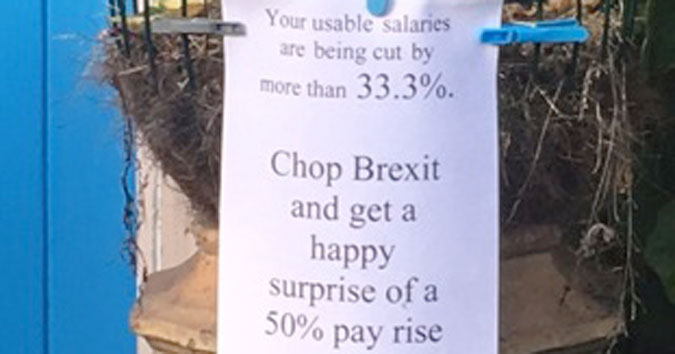
I saw this sign on a visit to Culross on Sunday (if you are ever in Fife, do visit – it’s lovely). It irritated me, so I photographed it and posted it on Twitter with the comment “Dodgy Brexit maths”.
The pushback was pretty quick. But the interesting bit was the part of the sign everyone took as being the point. I was subjected to endless comments from followers explaining to me that 33.3% would indeed represent 50% of 66.6%. But the bit that bothered me wasn’t that (I’m OK with maths), it was the idea that your “usable salaries are being cut by more than 33.3%” as a result of Brexit.
So keen are a large group of my Twitter followers to think that Brexit has made them poorer that they don’t appear to consider this to be dodgy maths, but it looks that way to me.
We can only assume that it somehow refers to the pound and to the inflation we can expect as a result of its fall against most currencies since 23 June. But how this year’s weakness in sterling is translated into a 33.3% fall in usable salaries is anyone’s guess (I suppose I should have stopped in to ask, but it was a Sunday and my kids aren’t much interested in Brexit).
A not quite 20% fall in the trade-weighted value of the pound does not translate into an equal and opposite percentage rise in prices (not every single input of every single product in the UK is produced abroad). At the same time, there has so far been no discernable effect on GDP (rising at an annual rate of 2.3% in the third quarter) or employment (the Nissan plant in Sunderland is good to go) as a result of the UK’s intention to leave the EU. Nor has there been one on house prices except for in prime central London (although of course if house prices were to fall, that would surely represent a rise in some people’s “usable income”).
There has, as the evidence-orientated man at the Office for National Statistics says, so far been “little evidence of a pronounced effect in the immediate aftermath of the vote”. All the things predicted by “Project Fear” may yet happen in the UK (early days, etc) – but right now I am less bothered by that possibility than by the fact that an awful lot of people seem to be convinced they already have.